Everything You Need to Know About Giving Your Cat Vitamins

Cat vitamins can support your cat’s health and nutrition. But not all supplements are made equal. Use these criteria to identify which supplement may be right for your cat.
Do Cats Really Need Supplements?
First off, let’s be clear that no supplement - no matter how amazing - can take the place of a healthy, balanced diet. But that doesn’t mean every cat can get all the nutrition they need from food alone.
Start by making sure your cat food is approved by The Association of American Feed Control Officials (AAFCO). AAFCO sets standards for animal feeds and pet foods in the USA, so their approval means your food has the right mix of fats, carbs, protein, and nutrients for cats.
Often, though, that isn’t enough. Every cat is unique, which means they can have unique nutritional needs.
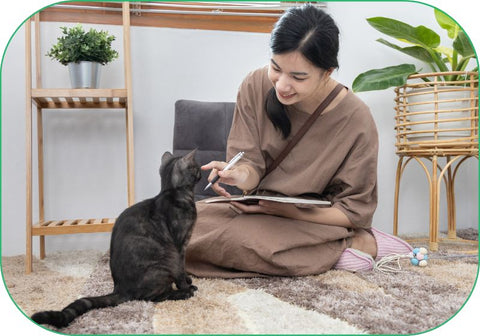
For example, your vet may recommend daily lysine supplements if your cat has feline herpes. Arthritic cats may benefit from extra omega-3s. Probiotics offer support to cats with digestive issues. Antioxidants offer multiple benefits since they limit damaging free radicals in your cat’s body.
When to Consider Giving Your Cat a Vitamin Supplement
If your cat suffers from certain medical conditions, a supplement may be able to help. Now, this doesn’t mean that supplements are the same as medicine or will cure these conditions, but they can provide vital support to help maintain your cat’s good health.
Joint Support
If you have an older cat, they may be suffering from Feline Osteoarthritis or OA. In fact, it’s estimated that 90% of cats over the age of 12 have OA.
While there is no cure for this degenerative condition, treatment plans that include supplementation with omega-3s can have your cat moving more easily and with less pain. That’s because of the anti-inflammatory properties of omega-3s and their benefits for joint health. Studies even show that omega-3s can help stop cartilage from degenerating further!

Weight Management
Obesity is one of the most common health problems in cats, affecting as much as 50% or more of feline patients. Being overweight or obese puts your cat at risk of additional diseases such as osteoarthritis and diabetes.
If you suspect your cat is overweight or obese, talk with your veterinarian about setting up a healthy, slow and steady weight loss plan for them. A supplement containing fish oil or omega-3s may be a part of that plan, as it may have a positive effect on your cat’s fat-burning metabolism.
Limited Diets
If your cat is “picky” and will only eat certain foods, they may end up with holes in their daily nutrients. A well-rounded cat multivitamin can fill in those holes and gaps to support those cats whose taste buds limit their diets.
Please note that if your cat’s diet has been limited by your veterinarian, always speak to them before adding any supplement to your cat’s diet.
Pin me!
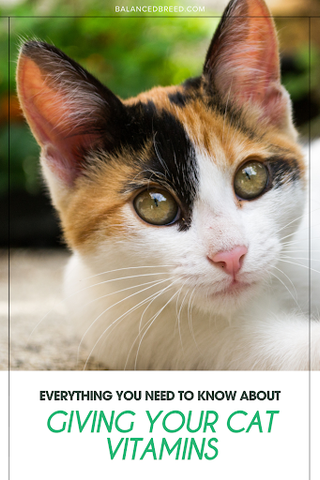
Anxiety
Anxiety in cats can show itself in many different ways, from hiding during a thunderstorm to crying when their pet parent leaves for work every day. While your veterinarian may recommend prescription medication for severe cases, supplements containing proper nutritional support and gut-soothing probiotics may help in calming your pet as well.

Kidney Health
Antioxidants can be beneficial for supporting the kidney health of cats. That’s because antioxidants help inflammatory response, and limiting inflammatory response helps our cats’ kidneys.
Senior Cat Health
Many health issues, like osteoarthritis or kidney disease, are more common in senior cats. In addition, senior cats may have a decreased appetite that prevents them from getting all the vitamins they need. A cat multivitamin can help fill any gaps in their vitamin and mineral intake, omega-3s may provide support for arthritic joints, and B12 and folic acid support their cognitive function.
Respiratory Support
L-lysine is known to promote healthy feline respiratory function. It is often recommended by veterinarians for cats who are prone to upper respiratory infections.
Immune Function
There are multiple vitamins and nutrients that provide powerful support for our cats’ immune systems.
When a cat is diagnosed with feline herpes, many vets will recommend L-lysine to help their immune system with repressing the infection. Omega-3s and astaxanthin, both found in krill oil, help maintain your cat’s immune system by building their cells’ resistance to infection. And B12 and folic acid assist in the immune system’s overall maintenance.
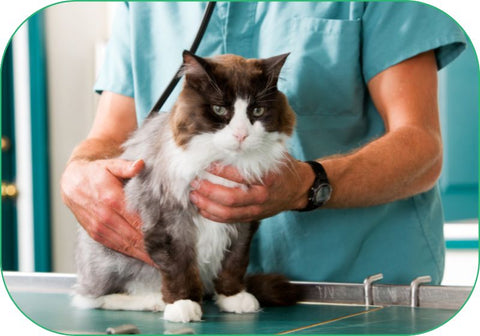
Heart Health
Krill oil is a great supplement to support your cat’s heart health. It contains fatty acids and antioxidants that promote a healthy cardiovascular system.
Amino acids like L-carnitine and taurine are also often connected to supporting a healthy heart rhythm as well as the heart muscle itself.
Skin & Coat Health
A beautiful, shiny coat and healthy skin don’t happen without the proper nutritional support. In addition to a healthy, balanced diet, a well-rounded cat multivitamin containing omega-3s will help inflammatory response, which can provide great support for your cat’s coat and skin.
Cats with allergies or sensitive skin may see even more benefits from this additional support.
Managing Inflammation
Inflammation has been connected to many diseases and conditions, from arthritis to IBD to autoimmune diseases and more. Supplements that help the inflammatory response, like those containing krill oil, are a great way to support your cat’s overall health.
General Wellbeing
Even if a cat isn’t dealing with any medical conditions or illnesses, they still need proper nutritional support to be their best selves. Providing them with a balanced multivitamin with ingredients that support all their major organ systems is one way to ensure they will have the vitamins and nutrients they need to live happy, healthy lives.
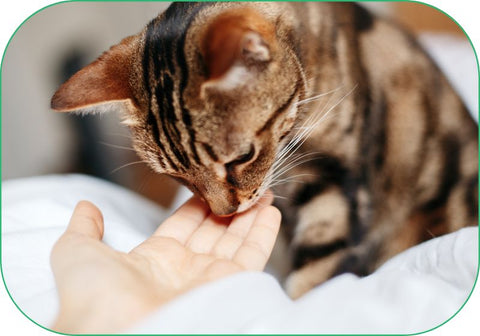
3 Basic Ingredients Your Cat Needs in Their Multivitamin
L-lysine
L-lysine is an essential amino acid. It is known to promote healthy respiratory and eye function, and it provides immune support. As mentioned above, veterinarians often recommend L-lysine as immune support for cats suffering from feline herpes or chronic upper respiratory infections.
Feline herpes is incredibly common. In fact, almost all cats are exposed to it as kittens, but they may or may not show symptoms. This upper respiratory disease is unique to cats and can cause symptoms like sneezing, nasal discharge, and eye irritation.
If your cat is one of those who develops symptoms, they often will clear up within 2-3 weeks. However, in some cats, feline herpes can cause chronic eye inflammation, called eosinophilic keratitis.

For cats with chronic symptoms, L-lysine is often the vet-recommended treatment option. Even in cats with no symptoms, the virus never leaves, so L-lysine may also be recommended during stressful times to prevent the virus from reactivating.
Fish Oil / Omega-3s
The omega-3 fatty acids and antioxidants in fish oil are renowned for their role in helping the inflammatory response. And, since inflammation has been connected to multiple issues in conditions in cats, helping the inflammatory response is a great way to support your cat’s overall health.
Fish oil can be obtained from various marine animals, from salmon to mackerel to anchovies to krill. Sourcing matters!
Fish oil from smaller animals like krill that are lower in the food chain is naturally lower in heavy metals like mercury or lead. Their shorter lives mean they have less time to absorb them.
With larger, longer-lived fish like salmon, look for oil from wild-caught fish instead of farm-raised. Studies have shown far lower levels of harmful contaminants in wild-caught salmon versus farm-raised.
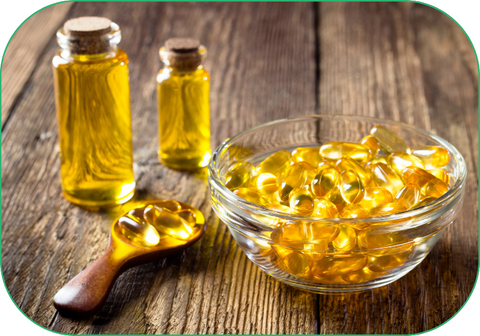
B12
Cats are unable to produce vitamin B12 on their own, so they have to get it from their food or a supplement. A cat with B12 deficiency can experience reduced appetite, diarrhea, lethargy, and even neurological problems.
Providing your cat with healthy sources of B12 supports their immune, digestive, and nervous systems as well as their cognitive function.
How to Choose the Right Vitamin Supplement for Your Cat
If you’ve searched for a cat vitamin supplement, you may have been overwhelmed with the choices available to you. How do you know if you’re getting the high-quality supplement your cat deserves?
The Ingredients
Some pet supplements are made cheaply by stuffing them to the brim with harmful binders or fillers. Manufacturers don’t always disclose their inactive ingredients - and that’s where those potentially harmful fillers lie.
Look for supplements that don’t hide what’s in their recipe. Natural and proven ingredients are the way to go. Vitamins that are cold-pressed provide additional benefits since heat can destroy their active components.
Where They’re Made
Pet supplements do not have the same stringent manufacturing requirements that human supplements do, so you have to be confident that the company making your cat’s vitamins is trustworthy and has high standards for manufacturing safety.
For example, our ingredients are sourced and procured from pre-qualified manufacturers and distributors located in the United States. Our facilities are USDA-inspected & third-party audited based on 21 CFR Part 117 – CGMP Practice, Hazard Analysis, & Risk-Based Preventive Controls for Human Food.
Look for companies that refuse to sacrifice the quality of their supplements or the safety of your pet for their bottom line.
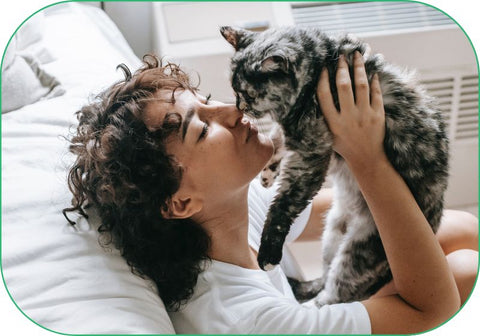
Who’s Formulating Them
Is your cat’s supplement designed by scientists with extensive experience with feline health? Does it have the approval of those in the veterinary profession?
You want your cat’s vitamins to be formulated by scientists with experience making supplements specifically for animals - and the more years of experience the better! Also, see if they are backed by or approved by veterinarians or veterinarian-pharmacists. With animal experts formulating and approving your cat’s vitamins, you can be sure your cat is getting the highest quality supplements to support their health.
How Often Should You Give Your Cat a Multivitamin?
Most cat multivitamins are designed to be given once a day. Be sure to check the dosage instructions on the package to ensure your cat is getting the right amount of vitamins for their weight.
Also, always check with your veterinarian before starting your cat on a supplement regimen - especially if they are currently taking other medications or being treated for any medical conditions.
Supplements work best when they are used consistently and for longer periods of time. This means you probably won’t notice a difference in your cat after just a couple of days. Sometimes it takes several weeks for you to see the changes.
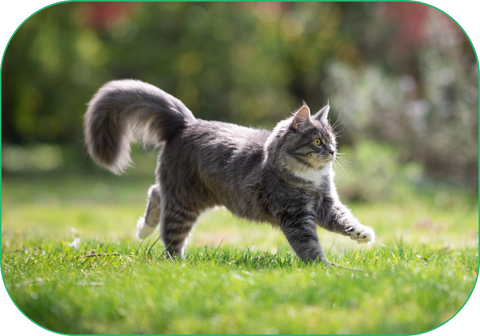
But once you start noticing things like softer fur, better digestion, and more playfulness, you’ll be glad you started when you did. To make sure you don’t miss a day and get to see all those wonderful results, a regular supplement subscription is best.
The Tail End
While not every cat needs supplements in their diet, they can provide numerous benefits for many. From providing immune support to helping inflammatory responses to supporting senior cats and more, a good supplement can be a wonderful aid for your cat. By picking a supplement that is manufactured with the best ingredients and at the highest standard of quality, like here at Balanced Breed, you can help your furry family member live a happy, healthy life.


Got rid of herpes 1&2 completely, I started the treatment August 2022 for 14 days till now 2025 I have not had a single outbreak, All thanks to Dr. chalopa. --E mail. (drchalopa@ gmail. com)
Leave a comment